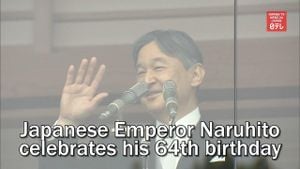Allegations have surfaced surrounding the United States Agency for International Development (USAID) and its purported allocation of $21 million aimed at facilitating voter turnout for elections in India. This claim, primarily brought to light by former US President Donald Trump, has led to mounting concerns about foreign interference as India prepares for its 2024 General Elections.
External Affairs Minister S. Jaishankar, responding to Trump's assertions, described the allegations as "concerning and worrisome." Speaking at the 12th International Health Dialogue on February 22, 2025, Jaishankar emphasized the need for transparency, stating, "If there’s something to it, then the country should know who the people are involved in it." His remarks indicate the Indian government's seriousness about investigating this contentious issue, which could have ramifications for India’s political climate.
Trump claimed during various public engagements, including at the 'Governors Working Session,' "$21 million going to my friend Prime Minister Modi in India for voter turnout. We’re giving 21 million for voter turnout. What about us? I want voter turnout too.” This statement reflects his overarching narrative about the Biden administration allegedly intervening to favor certain political figures abroad.
According to Jaishankar, the USAID was permitted to operate within India under the assumption it was engaged in "good faith activities." He noted with growing apprehension the suggestions being made about the agency’s actions now might involve "bad faith." The Ministry of External Affairs (MEA) expressed their own concerns previously, labeling Trump's allegations as "deeply troubling" and arousing fears of foreign interference.
"We have seen information put out by the US administration... This has led to concerns about foreign interference in India’s internal affairs," stated Randhir Jaiswal, spokesperson of the MEA. He underscored the necessity for relevant agencies to investigate the claims fully before making any public comments due to the sensitiveness of the matter.
The political arena has reacted decisively, with India's opposition party, the Congress, demanding clarity from the government on such allegations. Pawan Khera, head of Congress' media department, urged for a comprehensive white paper addressing not just USAID funding, but all foreign funding under Indian law. Their calls reflect the mounting unease surrounding possible external influences on the electoral process.
The ruling Bharatiya Janata Party (BJP), on the other hand, has utilized these allegations to challenge Congress, with BJP leader Ajay Alok arguing, "It seems like Congress and its leaders... have gone crazy." He claimed, "This is part of a deep state. The Bharat Jodo Yatra was also being funded from this money," indicating the BJP’s intent to frame the issue as one deeply intertwined with political loyalties and national integrity.
Interestingly, the controversy has sparked accusations within the political machinery, with BJP leaders alleging links between the opposition and foreign financiers, such as George Soros. They have positioned these claims as attempts to undermine India's democracy, drawing sharp distinctions between party lines.
Several Indian agencies, including the Enforcement Directorate (ED), are deliberated the initiation of formal investigations focusing on the possibility of USAID's influence during the electoral campaign. An outline of their plans details collecting data on how funds were distributed and assessing possible channels for any foreign intervention.
With the investigation still forthcoming, the government remains adamant about preventing any foreign influence over its electoral process. Both the MEA and various political factions are rallying to express their stances on the matter.
This development raises significant questions about foreign funding policies and the transparency required when such allegations arise. With the Indian public now alerted to the foreign funding claims, there will likely be intense scrutiny over how such funds have impacted the political discourse and election processes.
Although Trump’s comments have ignited debate, they have also sparked scrutiny and introspection among Indian officials and citizens alike about the fundamental principles governing democracy and the necessity for safeguard mechanisms against external manipulation. It remains to be seen how investigations will evolve and what ramifications will result if credible evidence of wrongdoing is detected. With everything at stake, the upcoming elections might witness substantial changes to how parties approach foreign funding and transparency.



